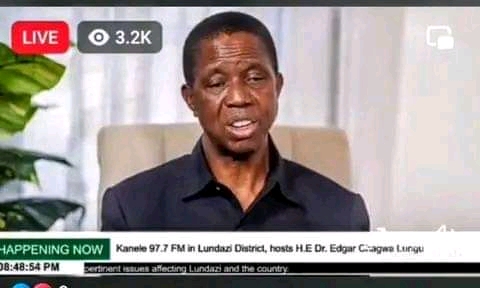Dalitso’s 80 Cars, 15 Properties, and Millions in Rentals is a Clear Comfirmation of The Lungu Family’s Legacy of Greed and Betrayal
By Magret Mwanza
As the curtain slowly closes on former President Edgar Lungu’s reign, the stench of corruption refuses to dissipate. With the Economic and Financial Crimes Court (EFCC) setting December 6, 2024, as the date for judgment on the forfeiture of over 80 vehicles and other properties belonging to Edgar Lungu’s son, Dalitso, the country is reminded of the reckless plunder that characterized the Lungu family’s time in power. This is not a matter of political persecution, as some would want the public to believe; this is the beginning of justice. The magnitude of wealth amassed by Dalitso, his sister Tasila, and other family members is staggering, and it highlights the systemic abuse of public office under the former president.
Dalitso Lungu, an individual without a traceable income justifying such massive acquisitions, has been found with 80 vehicles registered in his name. As if that were not enough, he also owns filling station, rented out for an astounding $52,000 per month, along with 15 properties located in Lusaka’s most affluent areas. How can one justify such a portfolio while the majority of Zambians struggle daily, and hospitals lacked the most basic medical supplies during his father’s presidency? The sheer opulence amassed by the Lungu family can no longer be masked as mere political persecution—it is the result of blatant economic rape of the Zambian people.
In a separate ruling, the court recently ordered the forfeiture of Tasila Lungu’s farm valued at K13.9 million, also for being a proceed of crime. The implications are clear: the Lungu family systematically looted the nation’s resources for personal gain. These properties and assets are not mere symbols of success; they are the fruits of exploitation, the consequence of a government that allowed the powerful to enrich themselves while the masses were left to fend for survival.
Dalitso’s case is emblematic of the broader corruption that pervaded his father’s administration. The 80 plus vehicles, multiple properties, and lucrative rentals all point to one thing: an insatiable appetite for wealth that went unchecked for years. The Lungu family saw public office not as a chance to serve the nation but as a golden opportunity to enrich themselves at the expense of the Zambian people. The wealth, amassed in a few short years, reveals a pattern of greed, and it serves as a stark reminder of the scale of plunder that took place during Edgar Lungu’s presidency.
The depth of this scandal is more than criminal—it is morally bankrupt. How can one individual accumulate so much while hospitals lacked medicine, children went without education, and the economy collapsed under the weight of mismanagement? The Lungu administration not only allowed this but thrived on it. The disconnect between the lavish lifestyle of the former first family and the desperate conditions faced by ordinary Zambians is a betrayal of the nation’s trust.
No amount of political maneuvering or attempted comebacks will wash away these sins. Dalitso and his family’s wealth were not earned through legitimate means; they were stolen from the people of Zambia. The properties, the cars, and the businesses are all products of systemic corruption, and the courts must deliver justice by stripping away this ill-gotten fortune.
What makes this case particularly egregious is the brazenness with which this looting occurred. Dalitso did not just acquire a few properties here and there—he amassed an empire. From 80 unaccounted-for vehicles to multimillion-dollar filling stations and prime real estate in Lusaka, his wealth mirrors the depths of the Lungu family’s corruption. This is not simply about the accumulation of wealth; it is about the devastation left in its wake. Every Kwatcha stolen by the Lungu family was a Kwatcha that could have been used to better the lives of ordinary Zambians. It could have provided medicine for sick children, funded education, or repaired the country’s dilapidated infrastructure. Instead, it was siphoned away for personal gain.
As Zambians await the court’s judgment, it is important to remember that this case is not just about one individual—it is about a system that allowed such blatant corruption to thrive. The Lungu family’s wealth represents the very worst of what can happen when power goes unchecked, when public office is seen as a means of personal enrichment rather than a duty to serve the people.
The upcoming judgment will hopefully set a precedent for future leadership in Zambia. It should be a reminder to all politicians and public officials that they are stewards of the nation’s resources, not its looters. No one, regardless of their position, should be allowed to enrich themselves at the expense of the people. The court must send a clear message: corruption, no matter how high up it reaches, will not be tolerated in Zambia.
This case also serves as a sobering lesson for those who still cling to the idea that Edgar Lungu’s presidency was anything other than a disaster for Zambia. The facts are laid bare before us. The Lungu family enriched itself while the nation suffered. The judgment day for Dalitso, and by extension the Lungu family, is not just a legal moment; it is a moment of reckoning for Zambia. The country cannot afford to return to the days of unchecked plunder, and the people must demand accountability from their leaders, present and future.
As December 6 approaches, the nation holds its breath, not just for Dalitso’s fate but for the fate of accountability in Zambia. The Zambian people deserve to see justice served, and they deserve a future where their leaders prioritize the nation’s well-being over their personal fortunes.

I concur.
This is the best post on Zambian Observer for a very long time. Factual and fair without malice.